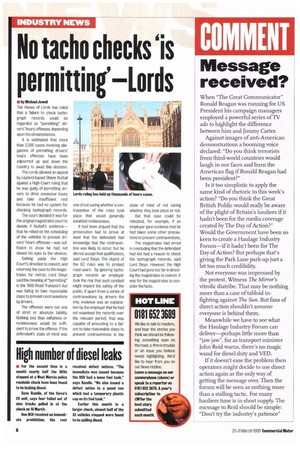No tacho checks 'is permitting' Lords
Page 8

If you've noticed an error in this article please click here to report it so we can fix it.
• by Michael Jewell The House of Lords has ruled that a failure to check tachograph records could be regarded as "permitting" drivers hours offences depending upon the circumstances.
It is estimated that more than 2,000 cases involving allegations of permitting drivers' hours offences have been adjourned up and down the country to await this decision.
The Lords allowed an appeal by Leyland-based Shane Nuttall against a High Court ruling that he was guilty of permitting drivers to drive excessive hours and take insufficient rest because he had no system for checking tachograph records.
The court decided it was for the original magistrates court to decide if Nuttall's evidence— that he relied on the scheduling of the vehicles to prevent drivers' hours offences—was sufficient to show he had not closed his eyes to the obvious.
Setting aside the High Court's direction to convict, and returning the case to the magistrates for retrial, Lord Steyn said the meaning of "permitting" in the 1968 Road Transport Act was failing to take reasonable steps to prevent contraventions by drivers.
The offences were not one of strict or absolute [lability Nothing less than wilfulness or recklessness would be sufficient to prove the offence. If the defendant's state of mind was one of not caring whether a contravention of the rules took place that would generally establish recklessness.
It had been argued that the prosecution had to prove at least that the defendant had knowledge that the contravention was likely to Occur, but he did not accept that qualification, said Lord Steyn. The object of the EC rules was to protect road users. By ignoring tachograph records an employer took the risk that such conduct might imperil the safety of the public. If apart from a series of contraventions by drivers the only evidence was an explanation by the employer that he had not examined the records over the relevant period, that was capable of amounting to a failure to take reasonable steps to prevent contraventions in the state of mind of not caring whether they took place or not.
But that case could be rebutted, for example, if an employer gave evidence that he had taken some other precautions to prevent contraventions.
The magistrates had erred in concluding that the defendant had not had a reason to check the tachograph records, said Lord Steyn. However, the High Court had gone too far in directing the magistrates to convict. It was for the magistrates to consider the facts.
















































































































